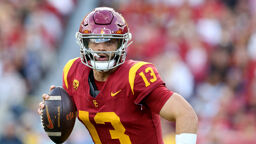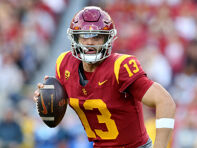What If? Week continues here at Outsports and across all SB Nation sites. Like all our “What If” stories, today’s work of speculative alternative history is based on real events.
Super Bowl VII. Los Angeles Coliseum. January 14, 1973. Fourth quarter, Miami 14, Washington 0.

“The Redskins stand at the Dolphins’ 11. It is their deepest penetration of the game… Kilmer into the endzone… and it hits the goal post… He had Jerry Smith, the tight end, looked like he was open.”
But what if that pass didn’t hit the goalpost? NBC’s Curt Gowdy might have said this instead.
“Kilmer into the endzone… Smith is there… Touchdown!!! Jerry Smith on the receiving end.”
Imagine we are there: Miami’s lead is cut to 14-7, and that is followed by:

“This kick is blocked… Yepremian has it… Throws a pass up with the ball… It’s Mike Bass… he’s running away for a touchdown… Mike Bass scores!”

What was looking to be a coronation for the unbeaten Miami Dolphins is now a tie game at 14. An impressive defensive stand put the ball back in hands of Washington’s “Over The Hill Gang” in the final minute. Billy Kilmer mounts a desperate last drive to avoid overtime. Four completions, three of those to Jerry Smith, gets them to the Dolphins 22 with 18 seconds left.
“What an upset this would be if they score… Kilmer back… He has Smith again… diving catch… Touchdown Jerry Smith, and he was in-bounds!”
“For the second time in a Super Bowl, Don Shula is stunned. The Washington Redskins come back to hand the Miami Dolphins their first loss to win 21-14. They are Super Bowl Champions!”
As if that wasn’t seismic enough, a sports earthquake erupts in the Washington lockerroom of the L.A. Memorial Coliseum, where Al DeRogatis is interviewing the MVP of Super Bowl VII.
“Jerry Smith is the game’s MVP with 6 catches with 88 yards and 2 touchdown including the game winner. You’ve been a quiet force for this team all season. What does this mean to you to get the win and the MVP?”
The best tight end in the NFL, blonde hair matted in furious sweat and effort, looks into the bright lights and into the lens of the NBC cameras. Safety Brig Owens, Smith’s best friend on the team, looks on within earshot with a big smile on his face when Smith speaks.
“Al, I’m thinking of Vince Lombardi right now, and the confidence he placed in me when he coached here. The trophy is named after him now and I’m proud to hold it. I’m also proud to be gay. I hope today shows the country that a homosexual can compete in the biggest game in the world and win!”

In our alternate reality scenario, what happens that day in L.A. causes a commotion countrywide in the days and weeks afterward. Gay America beams with a new spark of pride. Straight America isn’t ready and neither is the front office of the Washington Redskins, even if Smith’s teammates are.
Leading up to the 1973 NFL Draft, an ownership fretting anti-gay backlash looks to make a trade. On Draft Day, Jerry Smith is traded to the Oakland Raiders.
On the field, Smith and fellow all-pro Dave Casper become a deadly combo at tight end. In 1976, they help power the Raiders to a win over the Minnesota Vikings in Super Bowl XI. The next year, Smith retires from pro football with 530 receptions for 6,943 yards and 75 touchdowns. The touchdown mark sets an NFL record for tight ends that will stand until 2004.
Off the field, Smith plays a quiet, yet more involved role in the gay rights movement. He lends his name to causes from Harvey Milk’s successful state and federal level election campaigns, to lobbying Congress for AIDS research funding in the 1980s. He also makes himself available to other pro athletes who struggle with their sexual orientation or seeking to come out.

Jerry Smith dies of AIDS-related complications in 1989. In 1990, Congress passes the Jerry Smith AIDS Research, Prevention and Education Act: the first widespread federal effort to attack and prevent the disease.

Still, his football legacy does not take its rightful place for another 20+ years. A long struggle led by his best friend in the locker room, former safety-turned-D.C.-based businessman Brig Owens, ends with Smith’s enshrinement into the Pro Football Hall of Fame in 2013.

































